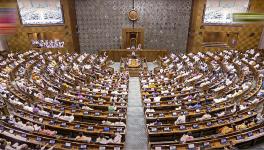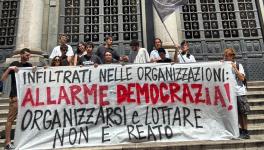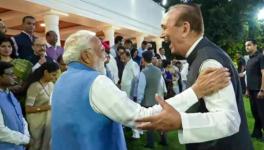Authoritarianism and the Crisis of Public Ethics in India
The failure of Indians in positions of authority to behave responsibly in public, raises reasons for concern over the crisis of public ethics in the country. This crisis is feeding into a particular kind of authoritarianism. Hence, at stake are not just the personal failures of judgment here and there, but the very nature of democracy in the country.
Indo-Pak cricket fixtures are a time of heightened anxiety for many people in the two countries. Traffic thins out as people sit glued to TV screens. Wild celebrations with crackers accompany every victory. Losses are taken as national calamities. Given such an atmosphere, it is hardly surprising that people do not hesitate to ask even complete strangers, about the state of a match. However, an anxious enquiry about the number of wickets down, sounds odd when a state health minister makes it during an official meeting with other senior ministers. In fact, it would be comical, except, the only tiny glitch being that the meeting was called to discuss encephalitis epidemic which had caused the death of more than 100 children in his state.
All societies make distinctions between what is looked down upon, and looked up on, and try to have an effective and functional sphere of ethics in public by appropriate rewards and disapprovals. Modern democratic societies allow significant freedoms in private lives; leaving it largely to the personal judgments of the people concerned, about what they can say or do. On the other hand public actions of all, can be, and are, subjected to public scrutiny. Any scrutiny is a rational judgment, which arrives at a decision on the basis of a more or less sharply defined set of rules. The charm, and the challenge of modern democratic societies, is that unlike tradition based societies, the set of rules are not given in stone, but themselves can be subjected to rational scrutiny. These considerations mean that any exercise of public authority in such societies is an object of scrutiny by people at large, who are free to pass judgment on its appropriateness. The cumulative weight of these judgments create the moral pressure of expectations of a decent behaviour. The effectiveness of this society-wide moral pressure can be determined from how far an ethical public behaviour has become the second nature of the people in authority. The frequency with which Indians in authority fail to behave ethically in public, indicates that the process of making rational scrutiny, passing judgments and creating moral pressure is non-functional and ineffective. People in authority in this country, appear to not even be aware of the fact that they are expected to behave ethically.
The brazenness of people in political authority is the proverbial tip of the iceberg, which actually extends to other sites of authority too. Bureaucrats prefer taking the easy way out, rather than showing any spine. Media pundits, on the other hand, prefer being cheer-leaders than asking tough questions to power. Spiritual gurus exploit existential anxieties of followers to turn them into ‘blind followers’. Even judiciary appears to be shielding itself under procedural wrangles and wolf-cry. Unlike politicians, who gain authority through popular mandates, and leave office when voted out, bureaucrats and law officials get to positions of authority on the basis of specialised knowledge and skills. Responsible exercise of their authority is supposed to be a part of their training. When it comes to them and them exercising their authority irresponsibly, it is then when one is forced to exclaim, “Why don’t ‘they’ get it?”
In an interview televised during the recent elections, PM Modi claimed that hours before the Balakot strike in Pakistan, Indian experts had second thoughts because of cloud cover over the target area. But he reasoned that the cloud cover would make it difficult for Pakistani radars to track Indian fighter planes, and decided to go ahead with the attack. The idea behind disclosing this information during elections, was perhaps to spread the image of a strong willed leadership brimming with situational intelligence. BJP’s social media cells immediately put up the link to the interview to amplify its intended message. However, these were taken down within a day after the PM's claim that radar cannot see through a cloud cover, was widely ridiculed. Our PM is known for making unscientific claims, even from the podium of the Indian Science Congress. However, what does this episode say about Indian experts? These experts were paid professional employees of the Republic of India. We do not know what (if any), reasons they gave to the PM for their hesitation or, how did they respond to the PM’s reasoning about radars? Did any of them think of disabusing the PM of his mis-conception? In fact, given the PM’s self-assurance on national TV about his knowledge of radars and clouds, it is very likely that all the experts acquiesced to his claim without a murmur. Passive submission to the higher authority is actually a systemic trait of Indians in authority. One could argue that it is the transposition of the psychology of the graded hierarchy of caste system onto the authority structure of our supposedly liberal democratic republic.
The third major lapse of ethics in public by Indians in position of authority, shows another systemic property: failure to separate private concerns from public responsibilities. On 19th April, 2019, an ex-employee of the Supreme Court of India, sent a signed affidavit to all the sitting judges of the court, claiming sexual harassment by the Chief Justice of India, followed by subsequent victimisation and dismissal from the job. There are no procedures in place to handle complaints of sexual harassment against the Chief Justice of India. Instead of deliberating upon how to handle the said allegation, the CJI constituted a three member bench of the court in a special sitting on the very next day, on a Saturday. While sitting on the bench, ‘he’ dismissed allegations against ‘himself’ and also claimed that a larger conspiracy was afoot to ‘deactivate’ the office of the CJI.
On the go, he also mentioned that the woman complainant already had two criminal complaints registered against her, and that he had given 20 years of selfless service with a bank balance of Rs 6,80,000/ only. Subsequently, a three member in-house enquiry panel of senior judges was constituted to find out the truth about the alleged molestation. One of the members of the committee had to recuse himself after the complainant questioned his membership, since he had already made public statements against her allegations. The in-house enquiry panel entertained no responsibility towards the complainant, or towards the public at large. It gave its decision exonerating the CJI of any wrongdoing ex-parte, (i.e. without complainant’s participation in the proceedings). The reasons behind its decision are not in the public domain. It is not even known whether it investigated only the matter of alleged molestation, or also of subsequent victimisation as claimed in the original affidavit.
THE MORAL ATMOSPHERE OF A SOCIETY AND PUBLIC ETHICS
Failure to behave ethically in public, needs to be distinguished from corruption. The latter in fact is a crime, while none of the cases mentioned above fall in that category. Crimes are handled by specialised state institutions through elaborate legal procedures designed to establish guilt and enforcement of punishment. Public ethics, in contrast, fall in the nebulous zone of expectations that carry the moral weight of a ‘should’, rather than the command of a ‘must’. They work through softer powers of argument and persuasion and reside in the moral atmosphere of the society. All members of the society inhale and exhale in this atmosphere; we get our moral compass from it, as well as contribute to it through our own judgments and actions. It is necessary for a healthy public ethic, that the moral atmosphere of the society encourages us to make moral judgments and has a filtering mechanism to warn us if we are wrong.
Public ethics in modern democratic societies cannot be separated from the exercise of public reason. As mentioned above, the scrutiny of an action involves use of our rational faculty to arrive at an evaluative judgment. When we give reasons for our judgments, we also show that our evaluations are not based upon our preconceptions, prejudices, tastes or opinions. Further, our reasons fertilise the domain of public ethics, adding on to the considerations on which we judge whether a public action is appropriate or inappropriate. For example, we may be disapproving of a minister asking a question about a cricket match during an official meeting on the basis of the belief that an official meeting must be distinguished from a private gathering of friends and family. We may also believe that the death of hundred children is sufficient of a crisis for the minister in charge of the state health department to not treat it as a routine affair. Our disapproval of the conduct of experts during the Balalkot air-strike meeting may be based on the belief that technical matters are best decided by experts, rather than folksy wisdom of an ill-informed Prime Minister. Further, we may believe that the primary duty of an expert is to present his/her professional opinion, rather than succumb to what his/her boss demands.
Our rational judgements about public actions are helped by certain dictums, which express wisdom gained over centuries of experiences. For example, the requirement that there should not be any ‘conflict of interest’, emerges from the recognition that public institutional structures are populated with multiple interests which could be in conflict and that the integrity of these structures is of paramount importance. These structures acquire their legitimacy by claiming to serve larger social goals. Even a perception that the larger social goal may have been compromised, damages this legitimacy. Hence, they need to be protected from any real or imaginary conflict with the private interests of the persons occupying a position of authority. A university faculty cannot be an examiner for an examination which anyone of her/his near relative is writing. Further, there may be a conflict between two official positions. As an official of the National Cricket Academy, Rahul Dravid is expected to serve the interest of the Indian cricket as a whole. As an official of Indian Cements, which owns the Chennai Super Kings cricket team, he may be expected to further serve the interests of that team. Both interests are legitimate, but are likely to be in conflict. The dictum on conflict of interests means that the resolution of any such conflict cannot be left to his personal judgment. It is best that the opposing demands that two contending interests be resolved publicly, so that reasons for that resolution are there for anyone to see and scrutinise.
Distinction between the rights and privileges is a practical dictum that clarifies the limits of the freedom of action of people in authority, and hence, helps in judging a public action. Our rights create a framework for our personal freedoms. They are universal, are granted equally to everyone and can be taken away only under exceptional circumstances. In a society of equals, all positions of authority are positions of privilege, which can be enjoyed only as long as people in authority satisfy certain conditions. Societies generate authoritarianism through two possible paths. One, when people in authority resist being judged, and begin to believe that their position of authority is theirs as a matter of right, meaning they have personal freedom to enjoy it as they wish. The Emergency imposed by Mrs Gandhi was an extreme form of this condition. However, it should be noted that this condition, which creates a sharp distinction between the rulers and the ruled, has been the nature of authority in our country for the vast majority of Indians who live under multiple deprivations.
The second path to authoritarianism is actually more pernicious. Societies proceed along this path when the people at large stop judging those in authority, and develop a blind faith in the wisdom of rulers. This is the path to fascism. India is inching along this path. The recent National Election Survey and the earlier Lokniti data show that the percentage of Indian voters who think that the country needs a strong leader unencumbered by uncertainties of periodic elections, has increased from about thirty percent in 2005, to more than 60 percent in 2019. This is the real cost of crisis of public ethics in our country.
Sanjay Kumar teaches Physics at St Stephen’s College, Delhi
Get the latest reports & analysis with people's perspective on Protests, movements & deep analytical videos, discussions of the current affairs in your Telegram app. Subscribe to NewsClick's Telegram channel & get Real-Time updates on stories, as they get published on our website.
























